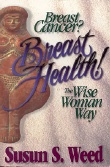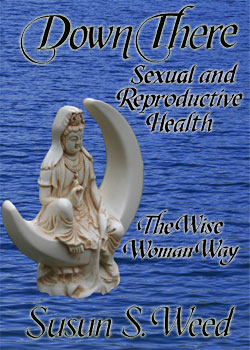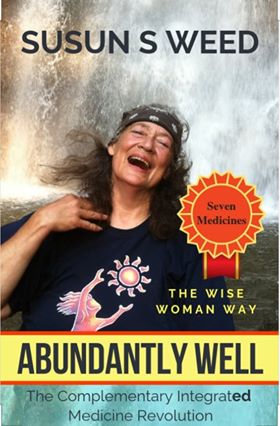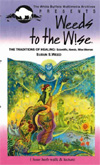www.susunweed.com
Using Herbs Simply and Safely
By Susun S. WeedAre herbs "dilute forms of drugs" - and therefore dangerous? Or are they "natural" - and therefore safe? If you sell herbs, you probably hear these questions often. What is the "right" answer? It depends on the herb! These thoughts on herbs will help you explain to your customers (and yourself) how safe--or dangerous-- any herb might be.
To prevent problems when selling or using herbs:1. Be certain you have the correct plant.
2. Use simples.
3. Understand that different preparations of the same herb can work differently.
4. Use nourishing, tonifying, stimulating, and potentially poisonous herbs wisely.
* Be certain you have the correct plant.One of the easiest ways to get into trouble with an herb is to use the "wrong" one. How could that happen? Common names for herbs overlap, causing confusion as to the proper identity. Herbs that are labeled correctly may contain extraneous material from another, more dangerous, herb. Herbs may be picked at the wrong stage of growth or handled incorrectly after harvesting, causing them to develop detrimental qualities.
Protect yourself and your customers with these simple steps:
o Buy herbs only from reputable suppliers.
o Only buy herbs that are labeled with their botanical name. Botanical names are specific, but the same common name can refer to several different plants. "Marigold" can be Calendula officinalis, a medicinal herb, or Tagetes, an annual used as a bedding plant.
o If you grow the herbs you sell, be meticulous about keeping different plants separate when you harvest and dry them, and obsessive about labeling.
* Use simples
A simple is one herb. For optimum safety, I prepare, buy, sell, teach about and use herbal simples, that is: preparations containing only one herb. (Occasionally I use will add some mint to flavor a remedy.)
The more herbs there are in a formula, the more likelihood there is of unwanted side-effects. Understandably, the public seeks combinations, hoping to get more for less. And many mistakenly believe that herbs must be used together to be effective (probably because potentially poisonous herbs are often combined with protective herbs to mitigate the damage they cause). But combining herbs with the same properties, such as goldenseal and echinacea, is counter-productive and more likely to cause trouble than a simple. A simple tincture of echinacea is more effective than any combination and much safer.)
Different people have different reactions to substances, whether drugs, foods, or herbs. When herbs are mixed together in a formula and someone taking it has distressing side effects, there is no way to determine which herb is the cause. With simples, it's easy to tell which herb is doing what. If there's an adverse reaction, other herbs with similar properties can be tried. Limiting the number of herbs used in any one day (to no more than four) offers added protection.
Side effects from herbs are less common than side effects from drugs and usually less severe. If an herb disturbs the digestion, it may be that the body is learning to process it. Give it a few more tries before giving up. Stop taking any herb that causes nausea, dizziness, sharp stomach pains, diarrhea, headache, or blurred vision. (These effects will generally occur quite quickly.) Slippery elm is an excellent antidote to any type of poison.If you are allergic to any foods or medicines, it is especially important to consult resources that list the side effects of herbs before you use them.
* Understand that different preparations of the same herb can work differentlyThe safety of any herbal remedy is dependent on the way it is prepared and used.
* Tinctures and extracts contain the alkaloids, or poisonous, parts of plants and need to be used with care and wisdom. Tinctures are as safe as the herb involved (see cautions below for tonifying, stimulating, sedating, or potentially poisonous herbs). Best used/sold as simples, not combinations, especially when strong herbs are being used.
* Dried herbs made into teas or infusions contain the nourishing aspects of the plants and are usually quite safe, especially when nourishing or tonifying herbs are used.
* Dried herbs in capsules are generally the least effective way to use herbs. They are poorly digested, poorly utilized, often stale or ineffective, and quite expensive.
* Infused herbal oils are available as is, or thickened into ointments. They are much safer than essential oils, which are highly concentrated and can be lethal if taken internally.
* Herbal vinegars are not only decorative but mineral-rich as well. A good medium for nourishing and tonifying herbs; not as strong as tinctures for stimulants/sedatives.
* Herbal glycerins are available for those who prefer to avoid alcohol but are usually weaker in action than tinctures.
* Use nourishing, tonifying, stimulating, and potentially poisonous herbs wisely
Herbs comprise a group of several thousand plants with widely varying actions. Some are nourishers, some tonifiers, some stimulants and sedatives, and some are potential poisons. To use them wisely and well, we need to understand each category, its uses, best manner of preparation, and usual dosage range.
Nourishing herbs are the safest of all herbs; side effects are rare. Nourishing herbs are taken in any quantity for any length of time. They are used as foods, just like spinach and kale. Nourishing herbs provide high levels of proteins, vitamins, minerals, antioxidants, carotenes, and essential fatty acids. Examples of nourishing herbs are: alfalfa, amaranth, astragalus, calendula flowers, chickweed, comfrey leaves, dandelion, fenugreek, flax seeds, honeysuckle flowers, lamb's quarter, marshmallow, nettles, oatstraw, plantain (leaves/seeds), purslane, red clover blossoms, seaweed, Siberian ginseng, slippery elm, violet leaves, and wild mushrooms.
Tonifying herbs act slowly in the body and have a cumulative, rather than immediate, effect. They build the functional ability of an organ (like the liver) or a system (like the immune system). Tonifying herbs are most beneficial when they are used in small quantities for extended periods of time. The more bitter the tonic tastes, the less you need to take. Bland tonics may be used in quantity, like nourishing herbs.
Side effects occasionally occur with tonics, but are usually quite short-term. Many older herbals mistakenly equated stimulating herbs with tonifying herbs, leading to widespread misuse of many herbs, and severe side effects. Examples of tonifying herbs are: barberry bark, burdock root/seeds, chaste tree, crone(mug)wort, dandelion root, echinacea, elecampane, fennel, garlic, ginkgo, ginseng, ground ivy, hawthorn berries, horsetail, lady's mantle, lemon balm, milk thistle seeds, motherwort, mullein, pau d'arco, raspberry leaves, schisandra berries, St. Joan's wort, turmeric root, usnea, wild yam, and yellow dock.
Sedating and stimulating herbs cause a variety of rapid reactions, some of which may be unwanted. Some parts of the person may be stressed in order to help other parts. Strong sedatives and stimulants, whether herbs or drugs, push us outside our normal ranges of activity and may cause strong side effects. If we rely on them and then try to function without them, we wind up more agitated (or depressed) than before we began. Habitual use of strong sedatives and stimulants-whether opium, rhubarb root, cayenne, or coffee-leads to loss of tone, impairment of functioning, and even physical dependency. The stronger the herb, the more moderate the dose needs to be, and the shorter the duration of its use.
Herbs that tonify and nourish while sedating/stimulating are some of my favorite herbs. I use them freely, as they do not cause dependency. Sedating/stimulating herbs that also tonify or nourish: boneset, catnip, citrus peel, cleavers, ginger, hops, lavender, marjoram, motherwort, oatstraw, passion flower, peppermint, rosemary, sage, skullcap.
Strongly sedating/stimulating herbs include: angelica, black pepper, blessed thistle root, cayenne, cinnamon, cloves, coffee, licorice, opium poppy, osha root, shepherd's purse, sweet woodruff, turkey rhubarb root, uva ursu leaves, valerian root, wild lettuce sap, willow bark, and wintergreen leaves.
Potentially poisonous herbs are intense, potent medicines that are taken in tiny amounts and only for as long as needed. Side effects are common. Examples of potentially poisonous herbs are: belladonna, blood-root, celandine, chaparral, foxglove, goldenseal, henbane, iris root, Jimson weed, lobelia, May apple (American mandrake), mistletoe, poke root, poison hemlock, stillingia root, turkey corn root, wild cucumber root.In addition, consider these thoughts on using herbs safely:
o Respect the power of plants to change the body and spirit in dramatic ways.
o Increase trust in the healing effectiveness of plants by trying remedies for minor or external problems before, or while, working with major and internal problems.
o Develop ongoing relationships with knowledgeable healers-in person or in books-who are interested in herbal medicine.
o Honor the uniqueness of every plant, every person, every situation.
o Remember that each person becomes whole and healed in their own unique way, at their own speed. People, plants, and animals can help in this process. But it is the body/spirit that does the healing. Don't expect plants to be cure-alls.
For permission to reprint this article, contact us at: susunweed@herbshealing.comSusun Weed - PO Box 64, Woodstock, NY 12498 (fax) 1-845-246-8081
Visit Susun Weed at: www.susunweed.com and www.wisewomanbookshop.com
Susun Weed’s books include:
Wise Woman Herbal for the Childbearing Year
Author: Susun S. Weed.
Simple, safe remedies for pregnancy, childbirth, lactation, and newborns. Includes herbs for fertility and birth control. Foreword by Jeannine Parvati Baker. 196 pages, index, illustrations.
Retails for $17.95
Order at: www.wisewomanbookshop.com
Healing Wise
Author: Susun S. Weed.
Superb herbal in the feminine-intuitive mode. Complete instructions for using common plants for food, beauty, medicine, and longevity. Introduction by Jean Houston. 312 pages, index, illustrations.
Retails for $21.95
Order at: www.wisewomanbookshop.com

NEW Menopausal Years the Wise Woman Way
Author: Susun S. Weed.
The best book on menopause is now better. Completely revised with 100 new pages. All the remedies women know and trust plus hundreds of new ones. New sections on thyroid health, fibromyalgia, hairy problems, male menopause, and herbs for women taking hormones. Recommended by Susan Love MD and Christiane Northrup MD. Introduction by Juliette de Bairacli Levy. 304 pages, index, illustrations.
Retails for $27.95
Order at: www.wisewomanbookshop.com
For excerpts visit: www.menopause-metamorphosis.com
Breast Cancer? Breast Health!
Author: Susun S. Weed.
Foods, exercises, and attitudes to keep your breasts healthy. Supportive complimentary medicines to ease side-effects of surgery, radiation, chemotherapy, or tamoxifen. Foreword by Christiane Northrup, M.D. 380 pages, index, illustrations.
Retails for $21.95
Order at: www.wisewomanbookshop.com
Down There: Sexual and Reproductive Health the Wise Woman Way
Publication date: June 21, 2011
Author: Susun S. Weed
Simple, successful, strategies cover the entire range of options -- from mainstream to radical -- to help you choose the best, and the safest, ways to optimize sexual and reproductive health. Foreword: Aviva Romm, MD, midwife, 484 pages, Index, illustrations.
Retails for $29.95
Order at: www.wisewomanbookshop.com
Abundantly Well - Seven Medicines The Complementary Integrated Medical Revolution
Publication date: December 2019
Author: Susun S. Weed
Seven Medicines build foundational health and guide you to the best health care when problems arise. Includes case studies, recipes, exentsive references and resources. Introduction by Patch Adams illustrated by Durga Yael Bernhard 352 pages, index, illustrations
Retails for $24.95
Order at: www.wisewomanbookshop.com
Susun Weed's Video & CD's:Weeds to the Wise DVD Video
Visit Susun's farm for a weed walk. Hear her talk on the Three Traditions of Healing. Make infusion with her. Fun! (1 hour VHS video) Please note: this VHS video tape is in NTSC format which may not be compatible with video players outside of the USA and Canada. Retails for $29.95
Order at: www.wisewomanbookshop.com
Susun Weed's "It's Time"
Wise Woman Center
25th Anniversary Celebration CD
GODDESS CHANTS CD
Visit www.goddesschants.com to hear all the songs, read lyrics &
learn about the artists.
18 Wise Woman Songs & Chants from the heart
Price: $15.00
For Wholesale orders see our terms letter or contact us at:
Ash Tree Publishing PO Box 64 Woodstock, NY 12498 ~ Phone/Fax: 1-845-246-8081
Website: www.wisewomanbookshop.com ~ E-mail: susunweed@herbshealing.com
Susun Weed, green witch and wise woman, is an extraordinary teacher with a joyous spirit, a powerful presence, and an encyclopedic knowledge of herbs and health. She is the voice of the Wise Woman Way, where common weeds, simple ceremony, and compassionate listening support and nourish health/wholeness/holiness. She has opened hearts to the magic and medicine of the green nations for decades. Ms. Weed's Six herbal medicine books focus on women's health topics including: menopause, childbearing, and breast health. Visit her site www.susunweed.com for information on her workshops, apprenticeships, correspondence courses and more! Venture into the Menopause site www.menopause-metamorphosis.com to learn all about the Menopausal Years the Wise Woman Way.
Join Susuns Mentorship site for personal one on one mentorship! We also invite you to visit our commerce site www.wisewomanbookshop.com to learn about our Wise Woman publications, workshops, correspondence courses. As well as online courses at Wise Woman School.
back to articles index
back to press kit
© Susun Weed -Wise Woman Center
~ Disclaimer & Privacy Policy ~







